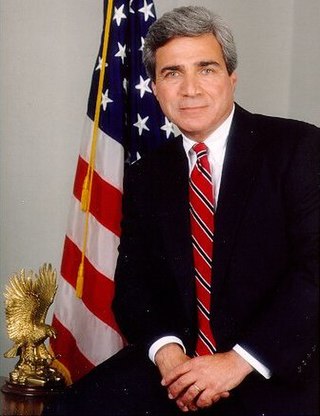
The Trilateral Commission is a nongovernmental international organization aimed at fostering closer cooperation between Japan, Western Europe and North America. It was founded in July 1973, principally by American banker and philanthropist David Rockefeller, an internationalist who sought to address the challenges posed by the growing economic and political interdependence between the U.S. and its allies in North America, Western Europe, and Japan. The leadership of the organization has since focused on returning to "our roots as a group of countries sharing common values and a commitment to the rule of law, open economies and societies, and democratic principles".

The Hoover Institution is an American public policy think tank which promotes personal and economic liberty, free enterprise, and limited government. While the institution is formally a unit of Stanford University, it maintains an independent board of overseers and relies on its own income and donations. It is widely described as conservative, although its directors have contested the idea that it is partisan.
The Walter A. Haas School of Business is the business school of the University of California, Berkeley, a public research university in Berkeley, California. It was the first business school at a public university in the United States.

The Center for Strategic and International Studies (CSIS) is an American think tank based in Washington, D.C. From its founding in 1962 until 1987, it was an affiliate of Georgetown University, initially named the Center for Strategic and International Studies of Georgetown University. The center conducts policy studies and strategic analyses of political, economic and security issues throughout the world, with a focus on issues concerning international relations, trade, technology, finance, energy and geostrategy.

Philip Lader, is a former US Ambassador to the Court of St. James’s and former chairman of WPP plc, the global advertising and communications services firm.
Membership in the Council on Foreign Relations comes in two types: Individual and Corporate. Individual memberships are further subdivided into two types: Life Membership and Term Membership, the latter of which is for a single period of five years and is available to those between the ages of 30 and 36 at the time of their application. Only U.S. citizens and permanent residents who have applied for U.S. citizenship are eligible. A candidate for life membership must be nominated in writing by one Council member and seconded by a minimum of three others.
The US–China Education Trust is a non-profit organization based in Washington D.C. Founded in 1998 by Ambassador Julia Chang Bloch, the first Chinese-American U.S. Ambassador, USCET seeks to promote China–United States relations through a series of education and exchange programs. The organization sponsors a variety of fellowships, conferences, workshops and exchanges, focused primarily on strengthening Chinese academic institutions related to the fields of American Studies, Media and Journalism, American Governance, and International Relations.

Steven Jonathan Spinner is an American business executive who is known for his work as an angel investor and adviser to Silicon Valley startups and his volunteer work as a fundraiser for President Barack Obama’s 2008 and 2012 presidential campaigns. He previously served as a stimulus adviser for the United States Department of Energy and was peripherally associated with the Department of Energy loan to a failed solar company, Solyndra.

Jonathan Finer is an American journalist and civil servant who serves as deputy national security advisor under national security advisor Jake Sullivan in the Biden administration. He previously served as the chief of staff and director of policy planning for former Secretary of State John Kerry at the U.S. Department of State.

Mark Steven Sandy is an American career official with the U.S. federal government. He served as acting director of the Office of Management and Budget (OMB) from January 20 to February 16, 2017. As of November 2019, he was the Deputy Associate Director for National Security Programs at OMB.






